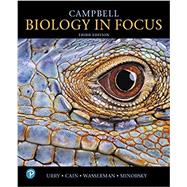NOTE: Before purchasing, check with your instructor to ensure you select the correct ISBN. Several versions of the MyLab™and Mastering™ platforms exist for each title, and registrations are not transferable. To register for and use MyLab or Mastering, you may also need a Course ID, which your instructor will provide.
Used books, rentals, and purchases made outside of Pearson
If purchasing or renting from companies other than Pearson, the access codes for the Mastering platform may not be included, may be incorrect, or may be previously redeemed. Check with the seller before completing your purchase.
For introductory biology course for science majors
This package includes Mastering Biology.
Focus. Practice. Engage.
Built unit-by-unit, Campbell Biology in Focus achieves a balance between breadth and depth of concepts to move students away from memorization. Streamlined content enables students to prioritize essential biology content, concepts, and scientific skills that are needed to develop conceptual understanding and an ability to apply their knowledge in future courses. Every unit takes an approach to streamlining the material to best fit the needs of instructors and students, based on reviews of over 1,000 syllabi from across the country, surveys, curriculum initiatives, reviews, discussions with hundreds of biology professors, and the Vision and Change in Undergraduate Biology Education report.
Maintaining the Campbell hallmark standards of accuracy, clarity, and pedagogical innovation, the 3rd Edition builds on this foundation to help students make connections across chapters, interpret real data, and synthesize their knowledge. Thenew editionintegrates new, key scientific findings throughout and offers more than 450 videos and animations in Mastering Biology and embedded in the new Pearson eText to help students actively learn, retain tough course concepts, and successfully engage with their studies and assessments.
Personalize learning with Mastering Biology
By combining trusted author content with digital tools and a flexible platform, Mastering personalizes the learning experience and improves results for each student.Built for, and directly tied to the text, Mastering Biology enables an extension of learning allowing students a platform to practice, learn, and apply outside of the classroom.
0134875044 / 9780134875040 Campbell Biology in Focus Plus Mastering Biology with Pearson eText -- Access Card Package
Package consists of:
- 0134710673 / 9780134710679 Campbell Biology in Focus
- 013487451X / 9780134874517 Mastering Biology with Pearson eText -- ValuePack Access Card -- for Campbell Biology in Focus








